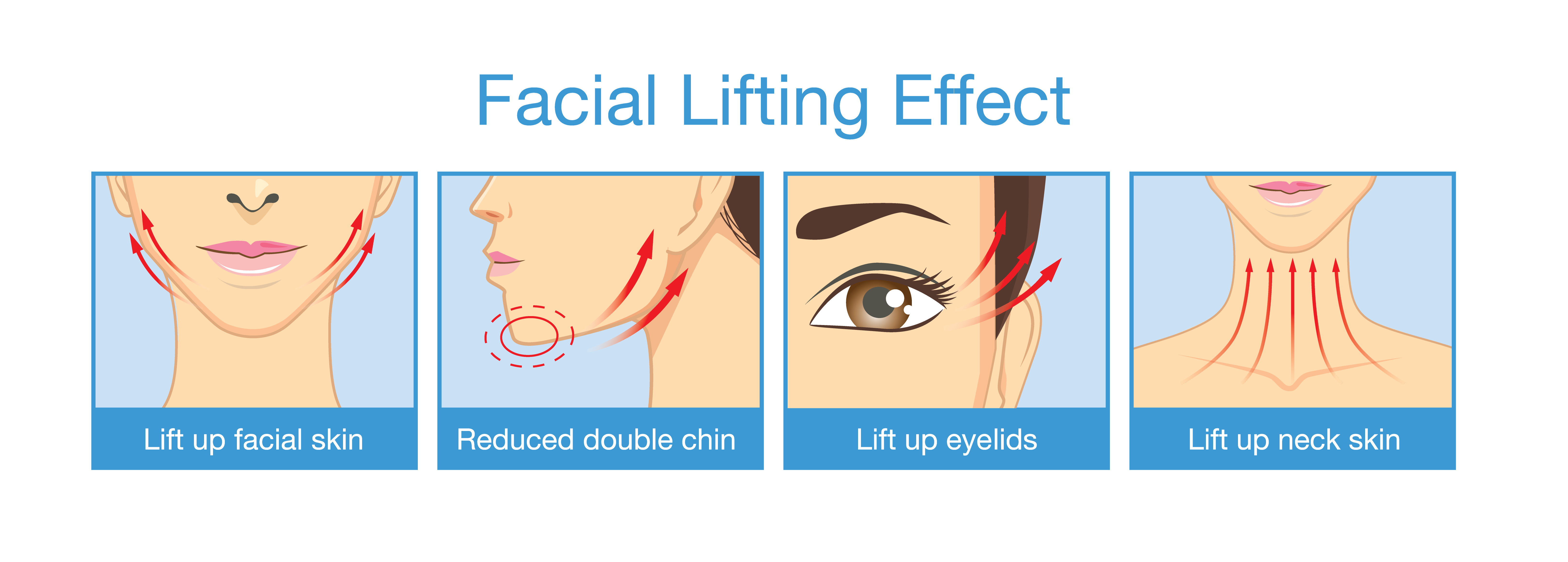
As we get older, our skin progressively loses its elasticity; this loosening skin produces wrinkles and creates the skin folds of the face, showing the sign of aging. To gain more youthful facial appearance, many people find a facelift to be a good solution. Face lift is performed in order to tighten loose skin, remove deep creases around the mouth and nose, and eliminate excess fat of the neck that appears as a double chin. During a face lift procedure, the facial skin is surgically lifted and underlying muscles and connective tissue is tightened, some fat and excess skin is then removed, finally, the incisions are closed with sutures. Facelifts generally takes around 2-3 hours depending on the extent of the surgery with 1 night admission. Typically, the candidate for facelifts is men or women aged around 40-50 years old who notice their sign of aging.
Full Facelift involves the surgical procedure of forehead, jaw, check and neck lift, the entire facial regions will be lifted to reduce wrinkling and sagging skin.
Mid Facelift focuses on the lift of central face, in the cheekbone area. For patient who is bothered by sagging of the cheeks and the surrounding area probably choose mid facelifts as an alternative to full facelift. Its goal is to restore the cheek area which is not different from full facelifts but the recovery is faster.
Neck Lift is the surgical procedure to remove excess skin and fat deposits from the neck area to improve visible sign of ageing. Neck lift can also be done along with mid facelift, but some people may choose to perform neck lift only because they are still satisfied with the upper facial appearance
Preparation
Your medical history will be reviewed and some medicines like aspirin, blood thinners like ibuprofen, anti-inflammatory drugs and herbal supplements cannot be taken. Do not drink alcohol and smoke for two weeks prior to face lift surgery. Wash your hair thoroughly the day before the surgery to reduce the risk of infection. Some people may be given additional instructions which are based on his or her medical history.
Post-operative care
Following the surgery, you should have much rest, keep your activities at minimum, use pillows to elevate your head while sleeping, sleep with your back of your head, and take prescribed medications to control the pain and discomfort as advised by the physician. Avoid bending over and lifting heavy objects, avoid hitting or bumping your face, and other strenuous activities to prevent the complications or bleeding.
Risk of Facelift Surgery
The risks found are infection, swelling and bruising, facial nerve injury, numbness in your cheeks, scalp and neck, and adverse reaction to anesthesia. You may also experience temporary or permanent hair loss at the incisions which will start to recover in approximately 3 months.
Categories
- FACE
- Blepharoplasty or Eyelid Surgery
- Scarless double eyelids surgery
- Rhinoplasty Augmentation
- Chin Implant
- Alar Reduction
- Augmentation Rhinoplasty and Alar Reduction
- Nose Implant Removal
- Facelift Surgery
- Unilateral and Bilateral Dimple Creation Surgery
- Unilateral and Bilateral Otoplasty
- Lip augmentation
- Cheek Implant
- BREAST
- BODY


